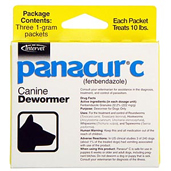Even if you don't see worms in your
dog's stool, he could be an unwilling host to any of a number of intestinal
parasites that threaten his health and can even sicken the people around
him.
Who Is Most at Risk?
Four types of intestinal worms most
frequently infect dogs.
Roundworm are primarily a problem for puppies.
They usually pick up these parasites from their mother, either while
they are still developing in the uterus or from suckling milk that contains
roundworm larvae. Adult dogs can also become infected when they
eat a small amount of dirt containing roundworm eggs or eat an infected
prey animal (e.g., a rodent).
Hookworms are frequently diagnosed in both adult dogs
and puppies. Like roundworms, these parasites can be passed from
mother to puppy or through ingestion of dirt contaminated with the eggs,
but hookworm larvae in the soil can also burrow through a dog's skin
and gain access to his body in that way.
Whipworms most commonly affect adult dogs or older puppies.
Whipworm eggs are shed in the feces of an infected dog and can survive
in the environment for years. Dogs become infected when they ingest
dirt containing the eggs, for example, when they lick their paws.
Tapeworms also tend to be found in adult dogs or older
puppies, especially those that harbor fleas. Mature tapeworms
in a dog's intestinal tract shed pieces of their body that can be
seen by the naked eye. They usually look like squished pieces
of rice that can be found, often still moving, around a dog's anus
or in his bedding. The parasite's eggs that are contained in
these body segments are eventually eaten by fleas which can pass on
the infection when they are in turn ingested by a dog or other animal
that is grooming itself. Other types of tapeworms that do not
rely on fleas as part of their life cycle also exist, so even flea-free
dogs can get tapeworms.
Why Owners Should Be Concerned
Intestinal worms can make dogs very
sick. Roundworms can cause diarrhea, vomiting, a bloated abdomen,
weight loss and poor growth, but some infected animals show no clinical
signs at all. Hookworms can also cause diarrhea and vomiting,
but because they suck their host's blood at their attachment site
in the intestinal tract, they can also lead to a potentially life-threatening
anemia. Whipworms typically cause diarrhea, while tapeworms may
cause anal irritation and "scooting" when the worm segments wiggle
around a dog's hind end.
"If you need to pick out a dewormer yourself, use one that kills the parasites most likely to be infecting your dog."
People can also become sick when they
are infected with canine intestinal parasites. The biggest problems
revolve around hookworm larvae that invade through the skin and roundworm
larvae that migrate to the eye or other parts of the body. One type
of canine tapeworm can also cause cysts in the human body. Keeping
your dog free of intestinal parasites and picking up his feces protects
both canine and human health.
Veterinary and Home Care
There are two ways deal with the threat
of canine intestinal parasites. The first is through the use of
fecal examinations. A veterinarian will look at a sample of feces
that has been mixed with a particular type of solution that causes worm
eggs to float to the surface. This helps diagnose exactly which
parasites are present, including some like Coccidia and Giardia
that are not technically worms and are not killed by traditional dewormers.
Your vet can then pick exactly the right medication to treat your dog.

Fecal examinations are an absolute
necessity for puppies and any pet that has diarrhea, vomiting or other
gastrointestinal symptoms. The downside of fecal examinations
is that they are sometimes falsely negative, meaning that no eggs are
seen even when parasites are present. For this reason, your veterinarian
may run several fecal examinations over a period of a few days or elect
to deworm even if the tests are negative.
Pet owners and veterinarians may also
elect to deworm without running a fecal examination. The positives
of this approach include simplicity and the fact that dogs that would
have a false negative fecal exam are still dewormed. The negative
side is that some dogs that don't need to be dewormed will be and
some parasites that are not killed by traditional dewormers may go undiagnosed.
If you need to pick out a dewormer yourself, use one that kills the parasites
most likely to be infecting your dog. Some types of heartworm preventatives also help protect against intestinal parasites.
Look at the label to see if this is the case. Whichever pet meds you choose, make sure to follow the instructions
closely. Many products require multiple doses to completely eradicate
the parasites. When in doubt, ask your veterinarian which product
is right for your dog.
The above is provided for information purposes only and should not be used for the diagnosis or treatment of any condition.
This information does not cover all possible variables, conditions, reactions, or risks relating to any topic, medication, or product and should not
be considered complete. Certain products or medications may have risks and you should always consult your local veterinarian concerning the treatment of
your pet. Any trademarks are the property of their respective owners.